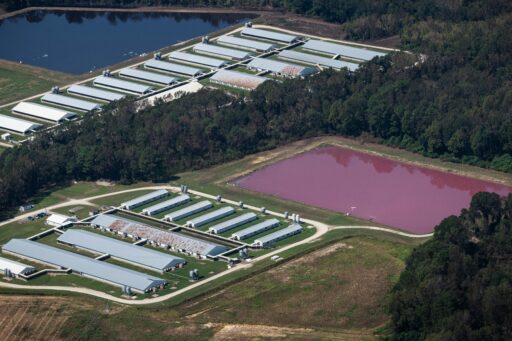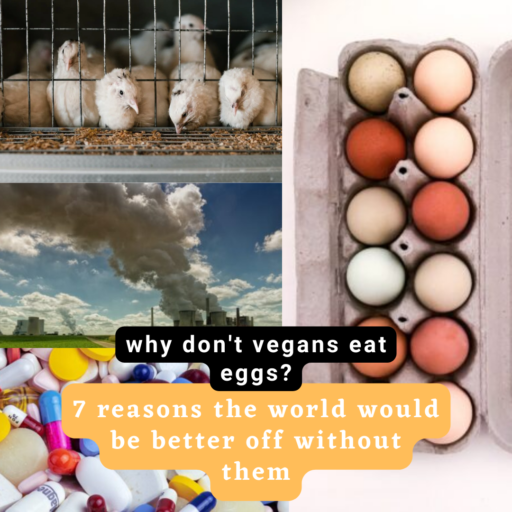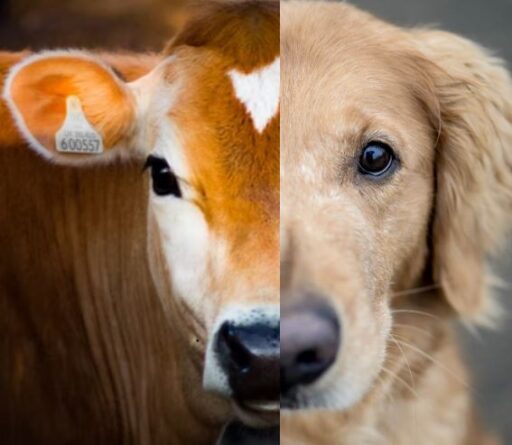If you haven’t thought much about the egg industry, it’s natural to wonder, “Why don’t vegans eat eggs?” On the surface, it doesn’t seem like there’s a problem. Chickens naturally lay eggs, which most people think are healthy to eat – what’s the issue?
The answer is that vegans don’t eat eggs because they avoid all animal products for ethical, health and environmental reasons. The egg industry exploits the reproductive systems of hens and kills male chicks. It promotes climate change and future pandemics. Finally, eggs promote cancer, diabetes, and cardiovascular disease.
- 1. The egg industry exploits hens’ reproductive systems and has selectively bred chickens, causing them physical suffering
- 2. The egg industry kills newborn male chicks
- 3. Eggs promote cancer, diabetes and cardiovascular disease
- 4. Eggs cannot legally be labeled “healthy,” “good for you” or even “safe.”
- 5. Egg production contributes to climate change
- 6. Egg production creates negative environmental and health consequences for workers and nearby communities
- . Egg production increases risk of future pandemics
- So, why don’t vegans eat eggs?
- Cooking without eggs is simple
1. The egg industry exploits hens’ reproductive systems and has selectively bred chickens, causing them physical suffering

Today’s laying hens have been bred to lay over 300 eggs a year, whereas their ancestors would lay only about 10-14 eggs annually. Not only is it a painful process for the chicken, but they lose vital nutrients through laying the eggs that weaken their bones. If you break open an egg and give it back to them, they will eat it because their bodies need the nutrients. Living in factory farming conditions is so stressful for chickens that they will peck violently at each other. Because of this, farmers cut off their beaks and toes.
2. The egg industry kills newborn male chicks

Because the baby male chicks of laying hens will not lay eggs and don’t grow as fast as chickens bred for meat, the industry simply disposes of them. As many as seven billion newborn baby male chicks globally are killed by being dropped into macerators or wood chippers within hours of being born.
Many people believe that buying eggs with labels like “cage free,” “free range,” or “American Humane Certified” solves any ethical issues with eggs. Yet these are just marketing gimmicks. The labels merely indicate less suffering, as even the labels with the highest standards still permit acts of cruelty, such as debeaking without painkillers and killing the newborn male chicks.
3. Eggs promote cancer, diabetes and cardiovascular disease

Eggs and Cancer
Numerous studies and meta-analyses link eggs to breast cancer, prostate cancer, ovarian cancer, colon cancer and colorectal cancer. They are connected through two primary mechanisms: cholesterol and choline. Although choline is an essential nutrient, animal-based sources of it are associated with higher risk of heart disease, stroke and death. In contrast, plant-based sources of choline provide us with this nutrient without increased risk of disease.
Cholesterol supports the rapid growth and proliferation of cancer cells. Even the industry-influenced federal dietary guidelines now recommend people “eat as little dietary cholesterol as possible.” Eggs also can be a source of carcinogenic chemicals formed during high temperature frying.
A few notable non-industry-funded studies have found that those who ate half an egg a day had a 14% increased risk of advanced and fatal prostate cancer. Just a few eggs a week is linked to 90% increased risk of colorectal cancer.
Men who ate even less than one egg a day doubled their risk of prostate cancer progression. Those who ate the most had a 70% increased risk of lethal prostate cancer. Men who consumed two and a half or more eggs per week had an 81% increased risk of lethal prostate cancer compared to those who consumed less than half an egg weekly.
In contrast, eating plant-based can change your gut microbial community to protect you against its development.
Eggs and Arterial Function
Studies by the American Egg Board claimed that eating eggs does not harm our arteries. They based this on the fact that participants who already had very high cholesterol levels (from consuming the standard American diet) did not have worse cholesterol after eating two eggs. This conclusion obscures the reality that these participants had already maxed out the amount of cholesterol they could absorb.
When people with healthy cholesterol levels ate the same number of eggs, their cholesterol levels shot up. Yet fat-free, cholesterol-free substitutes improved cholesterol levels and endothelial function. In other words, even their own studies showed that not eating eggs is better for our arteries and cardiovascular system.
Furthermore, eating eggs increases the risk of heart attack and stroke independent of whether you already have cholesterol levels. A study in the Canadian Journal of Cardiology also found that those who eat the most eggs have a 19% higher risk for cardiovascular problems.
Eggs and Diabetes
Just a single egg a week increases the odds of developing type 2 diabetes by 76%. Eating two eggs a week increases the odds by 97%. Those eating more than 5 eggs per week had three times greater risk of type 2 diabetes than those eating less than one egg a week. For those who already have diabetes, eating one egg a day doubles the odds of all-cause mortality.
Another review found a 39% higher risk of diabetes in people who consume three or more eggs weekly. According to a 2021 study in the British Journal of Nutrition that surveyed 8,000 participants, eating one or more eggs daily can increase the risk of diabetes by 60%. A review of fourteen studies published in the journal Atherosclerosis showed that people who eat the most eggs increase their risk of diabetes by 68%.
Risk of gestational diabetes also increases with egg consumption. In a study in the American Journal of Epidemiology, research found that women who ate one or more eggs a day had a 77% greater risk of diabetes compared with those who consumed the least.
American health organizations mislead us because they rely on industry-influenced, government-sponsored nutrition guidelines

Why is it, then, that when you Google search, “Are eggs healthy?” results from the American Heart Association (AHA), Mayo Clinic, Healthline, Cleveland Clinic, and WebMD tout the supposed health benefits of eggs?
Well, groups like The Mayo Clinic, Healthline, WebMD and the Cleveland Clinic receive funding from corporate sponsors and subscribe to government-sponsored Federal Dietary Guidelines for Americans, which has been heavily influenced by corporate interests. Furthermore, these sites are part of the mainstream medical establishment and are not impartial nutrition sources.
It is well-established that medical schools fail to provide adequate training in the use of nutrition to prevent and treat chronic disease, as indicated by research studies published in 2017, 2015, 2014, 2014, 2014, 2010, and dating all the way back to 1985. Also evident is the fact that America’s for-profit hospitals are motivated to treat disease with pills and procedures, not prevent it through nutrition.
Additionally, American health organizations like the AHA have partnered for years with food industries that promote the very products that lead to the diseases they aim to fight. For example, the AHA has partnered with Eggland’s Best for years.
Organizations like these often rely on contributions from meat, dairy, egg and pharmaceutical organizations and do not want to alienate their donor base. Additionally, given that only about 10% of the U.S. population is vegan or vegetarian (as of January 2022), the AHA is likely made up of people who consume animal products. It’s hard to promote something that you yourself don’t abide by.
As such, they reference egg industry-funded research. A meta-analysis in the American Journal of Lifestyle Medicine examined all research studies published from 1950-March 2019 looking at the effect of eggs on blood cholesterol. The study also examined funding sources and their influence on study findings.
Prior to 1970, research showed no industry influence on cholesterol research. But industry-funded studies increased to 60% between 2010-2019. Over 85% of the research studies, no matter the funding source, showed that eggs have negative effects on blood cholesterol. But 49% of industry-funded studies report conclusions that conflict with non-industry funded trials.
4. Eggs cannot legally be labeled “healthy,” “good for you” or even “safe.”
The science-based non-commercial public service health charity NutritionFacts.org reviewed information exchanged between the U.S. Department of Agriculture (USDA) and the American Egg Board, which was accessible due to the Freedom of Information Act. The American Egg Board is a promotional group whose mission “is to increase demand for egg and egg products on behalf of U.S. egg producers” with its $10 million annual advertising budget.
The Freedom of Information Act documents reveal that the U.S. Department of Agriculture warned the egg industry that saying eggs are “nutritious” or even “safe” may violate rules against false and misleading advertising.
Per USDA regulations, it is illegal for egg advertisements to portray eggs as being “healthy” or “nutritious” because eggs exceed FDA limits for saturated fat and cholesterol in foods with these labels. The industry also cannot legally label eggs, “low in fat,” “a rich source of protein,” “a nutritional powerhouse,” “high nutritional content,” “contribute nutritionally,” “healthful” or “good for you.”
The egg industry can’t even legally call eggs “safe.” This is because 142,000 are salmonella-poisoned every year. The only way to avoid salmonella in eggs? Avoid them all together. The American Egg Board’s own research showed that sunny side up should be considered unsafe. Because of bird flu viruses, they must be cooked firm to be safe.
What, then, are they allowed to say? The industry is allowed to market eggs “nutrient-dense” because there is no legal definition of it. They can say that it “can reduce hunger” and is “satisfying” and “fresh.” The industry can’t afford to tell the truth about eggs or the hens that lay them.
5. Egg production contributes to climate change

Eggs have been ranked as the ninth to thirteenth food with the highest carbon emissions, following meats and cheeses. The primary offenders in terms of carbon emissions are predominantly animal products, with the addition of coffee, chocolate, palm oil and olive oil.
Much of the carbon emissions from egg production (63%) comes from poultry feed. Producing eggs requires clearing land to grow grains and soy to feed the chickens. This creates high emissions from industrial nitrogen production, land-use change, and transport.
6. Egg production creates negative environmental and health consequences for workers and nearby communities

Communities who live near poultry farms also suffer from odors of mold, feces and corpses. Living a half a mile away from one, you can be inside with the windows shut and have the smell be so strong as to take away your appetite.
These overwhelming odors lead to lower property values in surrounding communities, who are often already minority or low income groups. The manure from these factory farms can seep into groundwater and run off into surface water, contaminating the drinking water supply and killing aquatic species. The bacteria and other pathogens in the dust generated by the farm can also cause health issues.
Injury rates among workers are high, with an average rate of 6.7 injuries per 100 workers, compared to an average of 3.8 for all workers. Workers are also more likely to be exposure to harmful bacteria, like salmonella, and gasses like ammonia and chemical vapors, which can lead to respiratory issues like acute or chronic bronchitis and asthma.
These noxious gasses are blown out of the houses with industrial fans, along with dried fecal matter. This can lead to salmonella infection, respiratory health problems, and 83 times more flies and mosquitos in homes within a half mile of egg facilities. It’s more than possible that the next COVID – or worse- could emerge from American factory farms.
7. Egg production increases risk of future pandemics

Crowding chickens together in industrial warehouses also creates the ideal grounds for rapid spread of infection and disease mutation. Already, there are eight new types of deadly avian flu circulating in factory farms around the world. Each has the potential to be worse than COVID-19.
Ex-livestock veterinarian and whistleblower Alice Brough warns, “Potential pathogens for pandemics in the future have much, much higher mortality rates [than COVID-19]. The CDC has tipped the next pandemic as an avian influenza, which has a mortality rate of 40%. It’s a horrifying thought, but it’s a very real possibility. The more that we’re creating these scenarios in which viruses can mutate that way, there is a very real risk of something much worse than COVID-19 happening. We only need to look at pandemics from the past to know this.”
In the spring of 2022, a deadly strain of avian flu ripped through American poultry farms, killing them within hours of infection. Yet this hardly garnered any public attention. The virus spread quickly among poultry, increasing the risk of mutating and becoming infectious to humans. Diseases spread and mutate quickly in industrial henhouses because the birds share nearly identical genetics and are packed together in dark and humid conditions.
Why don’t vegans eat eggs from backyard chickens?
Why don’t vegans eat eggs if they’re from backyard chickens? On the surface, it doesn’t seem like there is an ethical issue with eating “backyard eggs.” Yet there are four problems with this: hens benefit from eating their eggs, it deprives them of natural behaviors, it perpetuates an exploitative system, and it views animals as a resource.
1. Because modern day hens lose nutrients from laying so many eggs, they actually benefit from eating their own eggs. They might initiate this on their own or eat them if you break it open for them. This is because we have selectively bred them for our own gain.
This depletes calcium, vitamins and minerals and leads to osteoporosis and broken bones. A 2021 study showed that globally, around 80% of laying hens suffer from fractures. Other health issues they can develop as a result of nutritional deficiencies are egg yolk peritonitis and prolapses, both of which they can die from. One of the best ways to protect hens from nutrient deficiencies and health problems is to feed it back to them.
2. If you buy the chickens from a breeder, you’re still financially supporting the whole system that selectively breeds chickens for human benefit despite the fact that it harms them. You’re still supporting the system that macerates the male chickens. And the reason that commercial egg production exists in the first place is because originally we started with backyard eggs.
3. Thirdly, it is natural for laying hens to incubate their eggs. If we take their eggs from them, we deprive them of natural behavior and can cause distress. Hens don’t produce eggs for us and their bodies aren’t for us to use.
4. Finally, let’s consider why we would rescue the hens in the first place. Do we value them only for what they can produce for us? When we rescue a dog we don’t have this transactional mindset; rather, we do it because we care for them.
If we have backyard hens for their eggs, we compromise their health, deprive them of natural behavior and of what is theirs, support the system that exploits them in the first place and continue to view them as a resource rather than beings in their own right.
So, why don’t vegans eat eggs?
Vegans don’t eat eggs for three overarching reasons: concerns for personal health, environmental and public health concerns, and ethical reasons.
Firstly, eggs cannot legally be labeled “healthy,” “good for you” or even “safe.” They promote cancer, diabetes and heart disease. Federal Dietary Guidelines don’t publicize this because they are industry-influenced.
Egg production contributes to high carbon emissions. It poses a significant risk of future pandemics. Poultry farms also have dangerous working conditions and compromise the health and wellbeing of nearby communities.
Finally, chickens have been selectively bred to produce about 23 times more eggs than they naturally would (300 rather than about 13 annually) and suffer painful health consequences as a result. They benefit from eating their eggs to regain lost nutrients. The egg industry also kills newborn male chicks of laying hens within hours of birth in macerators because they will not produce eggs and will not grow fast enough to be profitable for meat.
Taking their eggs compromises their health, deprives them of a natural behavior and of what is theirs, supports a system that exploits them in the first place and continues to view them as a resource rather than beings in their own right.
Cooking without eggs is simple
To learn how to cook without eggs, check out this podcast from the Physicians’ Committee for Responsible Medicine and these egg replacement tips and egg recipes, as well as our savory oatmeal recipe and easy tofu scrambled eggs.


